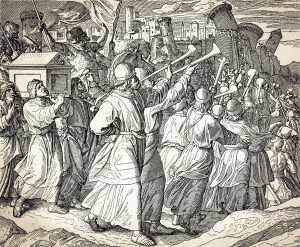In addition to calling for a Coca Cola-sponsored decapitation of Donald Trump’s political opponents to be broadcast live for children to watch, Turning Point USA CEO Charlie Kirk is making headlines again, this time claiming the United States government was formed based on the book of Deuteronomy.
“The comparisons of the U.S. Constitution with the book of Deuteronomy go back at least to the 1980s.”
“Out of all the books both secular and religious that were quoted the most in the founding of the country, Deuteronomy was by far quoted the most,” Kirk argued at a Turning Point USA Faith Event in North Carolina last month. “Deuteronomy talks about separation of powers, consent of the governed, an independent judiciary; the form of our government is directly inspired from Deuteronomy. And it makes sense because Moses is basically telling, ‘Hey Joshua, this is how you set up the government. You’re about to get into the land of milk and honey, you’re about to enter Canaan, this is how I recommend you set things up.’”
It’s a common claim by Christian nationalists. And while many critics of Christian nationalism believe the movement is a phenomenon that took off since Trump’s rise to the White House in 2016, the comparisons of the U.S. Constitution with the book of Deuteronomy go back at least to the 1980s.
But was the U.S. Constitution based on the book of Deuteronomy? And perhaps more concerning, what is it about the book of Deuteronomy that resonates with authoritarian Christians so much?

Charlie Kirk speaks to a gathering sponsored by the Conservative Baptist Network during the SBC annual meeting.
The absence of the Bible in developing the U.S. Constitution
According to a Supreme Court brief about “the clash between religious liberty and same-sex relations,” two Alabama attorneys argued: “We cannot fully appreciate the importance of religious freedom (sometimes called liberty of conscience) to the Framers of the Constitution without recognizing the role the Bible played in their thought.”
They pointed to a law passed Oct. 4, 1982, that declared 1983 to be the “Year of the Bible.” According to the brief, “The statute recognizes that ‘biblical teachings inspired concepts of civil government that are contained in our Declaration of Independence and the Constitution of the United States.’”
Then in 1984, Donald Lutz and Charles Hyneman published an article in The American Political Science Review titled, “The Relative Influence of European Writers on Late Eighteenth Century American Political Thought.”
According to their research, 34% of the citations they studied from documents written by the Founding Fathers were from the Bible. But Lutz added: “Anyone familiar with the literature will know that most of these citations come from sermons reprinted as pamphlets … amounting to at least 10% of all pamphlets published. These reprinted sermons accounted for almost three-fourths of the biblical citations.”
When Lutz limited his research to 1787 and 1788, which were two key years for forming the U.S. government, the Federalists cited the Bible 0% of the time, while the Antifederalists who were against the Constitution cited the Bible just 9%. Lutz reflected: “The Bible’s prominence disappears, which is not surprising since the debate centered upon specific institutions about which the Bible has little to say. The Anti-Federalists do drag it in with respect to basic principles of government, but the Federalists’ inclination to Enlightenment rationalism is most evident here in their failure to consider the Bible relevant.”

Thomas Jefferson Bible (Photo: Natoinal Museum of American History)
Misrepresenting the data
Soon after Lutz’s research was released, religious and political conservatives began misrepresenting his data. The work most often referenced over the last four decades has been David Barton’s flawed book, “The Myth of Separation: What Is the Correct Relationship Between Church and State?”
One might assume Barton would have mentioned the 34% Bible citation number Lutz found without noting the other data that don’t support his viewpoint. But Barton didn’t do that. Instead, he tripled Lutz’s numbers, claiming 94% of the founders’ citations were from the Bible.
As Chris Rodda, senior research director for the Military Religious Freedom Foundation, noted at the time: “He took the other sources listed in the study, like Montesquieu, Blackstone and Locke, and then claimed that because some of these other sources ‘derived their ideas from the Bible,’ the founders were indirectly quoting the Bible when they cited these other sources. Barton somehow determined by this method that an additional 60% of the citations in Lutz’s study came from the Bible, added this 60% to the already misrepresented 34% from the actual study, and, voilà, 94% of all quotes used by the founders came from the Bible.”
“Soon after Lutz’s research was released, religious and political conservatives began misrepresenting his data.”
Since Barton’s complete misrepresentation of Lutz’s data, conservatives have taken the baton and run with it. It has been promoted by the likes of Zionist pastor John Hagee and conservative pundit Glenn Beck over the past decade and has been referenced to promote teaching the Bible in public schools.
Deuteronomy as a Judeo-Christian theocracy’s constitution
One might wonder why Christian nationalists are so fixated on the book of Deuteronomy. But given how authoritarian Christians resonate with the vision of the United States as a theocracy, connecting Deuteronomy to the United States Constitution makes sense.
In Dictionary of the Old Testament: Pentateuch, J.G. McConville calls Deuteronomy the “Constitution for Israel.” Its name means “a copy of the law.” Its stated purpose in chapter one is “to expound the law.” It is structured as a series of four speeches from Moses as he transferred his leadership to Joshua. And it follows the ancient Near-Eastern Suzerain treaties between two nations of unequal power that culminate in blessings and curses for the nation with less power, depending on whether the nation follows the constitution or not.
In addition to prescriptions about worship, Deuteronomy establishes the laws for the institutions of judges, kings, priests and prophets. And it includes socio-religious topics such as criminal law, conduct during warfare, unsolved homicides, family law, social equity and what to do with the first fruits of harvest.
But while Deuteronomy discusses ancient legal topics some might connect to modern legal topics, perhaps the strongest reason it resonates with authoritarian Christians is due to Deuteronomy’s introduction to the conquest narratives.

(Lighststock)
Deuteronomistic history and the conquest narratives
Most people tend to group Deuteronomy in with the first five books of the Bible. But biblical scholars often place Deuteronomy as the first book of the Deuteronomistic History, which includes Joshua, Judges, Samuel and Kings.
These books provide a complicated telling of Israel’s history because they explore narratives of conquest from the perspective of exile. Biblical scholars believe these books were written by people who used sources that were originally put together before Israel’s exile and wove them into a narrative that would be relevant to Israelites living in various stages of exile.
So while the law in Deuteronomy was written in the style of an ancient Near-Eastern treaty between two nations of unequal power, the history in Joshua through Kings was written as a processing of conquest, ruling and exile between nations of unequal power from the perspective of a nation who lost its power and lived in exile. Thus, as those who claim to be God’s people today read these books, a central theme is how their nation’s law and history are to be told in relationship to the power of “God’s people.”
The Doctrine of Discovery and the conquest narratives
Because authoritarian Christians either lack awareness of or reject what biblical scholars have to say about the conquest narratives being written and redacted by Israelites processing their exile, they tend to read Deuteronomy through Kings as a triumphant story of conquest that eventually culminates in the conquest of Christ.
In The Hidden Roots of White Supremacy, Robert P. Jones tells how Christians used the Doctrine of Discovery for hundreds of years as a justification for “domination and colonial conquest.”
Jones quotes Pope Nicholas V, who wrote in 1452 that the Doctrine of Discovery gave Portuguese King Alphonso V the right: “To invade, search out, capture, vanquish and subdue all Saracens [Muslims] and pagans whatsoever, and other enemies of Christ wheresoever placed, and the kingdoms, dukedoms, principalities, dominions, possessions, and all movable and immovable goods whatsoever held and possessed by them and to reduce their persons to perpetual slavery.”
“That’s exactly how white Europeans justified their conquest of North America.”
If that sounds like the conquest narratives of Joshua through Kings where the Israelites committed genocide against or enslaved their Canaanite neighbors, including the murder and plunder of women and children, it’s because that’s exactly how white Europeans justified their conquest of North America.
The conquest narratives in American history
In 1637, after an all-night prayer meeting that led to burning between 400 and 700 Native Americans alive, mostly women and children, Captain John Mason, said, “Thus was God seen in the Mount, crushing his proud enemies and the enemies of his people … burning them up in the fire of his wrath, and dunging the ground with their flesh: It was the Lord’s doings, and it is marvelous in our eyes!”
Regarding another massacre, Dutch Navigator Captain David Pieterszoon noted, “Infants were torn from their mothers’ breasts and hacked to pieces in the presence of their parents, and pieces thrown into the fire and in the water, and other sucklings, being bound to small boards, were cut, stuck and pierced, and miserably massacred in a manner to move a heart of stone. Some were thrown into the river, and when the fathers and mothers endeavored to save them, the soldiers would not let them come on land but made both parents and children drown.”
Captain John Underhill’s response was, “I would refer you to David’s war. When a people is grown to such a height of blood and sin against God and man … sometimes the Scripture declareth women and children must perish with their parents … . We had sufficient light from the word of God for our proceedings.”
To this day, a monument on Long Island stands praising John Underhill as a “Distinguished Military Officer, Statesman, Pioneer.”

Christian nationalism’s Zionist Jericho Marches
One of the reasons today’s Christian nationalists are so resistant to any negative reflection on our violent past is they consider our violent past and the Deuteronomistic history narratives in the Bible that inspired them as something to honor.
When Billy Graham died in 2018, President Donald Trump spoke at the U.S. Capitol, reflecting on the founding of the United States where white people “prayed as they headed west, prayed as they headed into battle, and prayed as they marched for justice, and always marched for victory.”
“White evangelicals across the nation began hosting Jericho marches at state capitols.”
As Trump eventually lost his bid for a second term in 2020, white evangelicals across the nation began hosting Jericho marches at state capitols, where they pretended to be ancient Israelites marching around the walls of Jericho with shofars prior to plundering it and murdering everyone inside.
At the Jericho March in Washington, Eric Metaxas interviewed Charlie Kirk, declaring patriots are being called to fight “to the last drop of blood.”
Speaking of the United States as their “homeland,” the leaders of the Jericho March called on Jesus as “Yeshua” and invoked the vision of Moses, compared Trump voters to Israel crossing the Red Sea and taking Canaan. Alex Jones yelled, “This is the beginning of the Great Revival before the Antichrist comes!”
Twenty-five days later, with gallows erected outside, they breached the U.S. Capitol.

From biblical inerrancy to modern political authority
The reason Deuteronomy and its history books resonate with Christian nationalists like Charlie Kirk is that it inspires and, in their minds, authorizes them as God’s people today to conquer their neighbors as well.
This is why they go to such great lengths to defend biblical inerrancy despite the obvious problems of supporting the violence such defenses inevitably lead to.
Thus, defending biblical inerrancy is not synonymous with defending God’s authority. Instead, defending inerrancy lionizes the power Israel wielded over their neighbors in order to promote the power of white conservatives today.
Given how authoritarian Christians so vehemently celebrate Deuteronomy and the conquest, it seems reasonable for the rest of us to ask: What other laws or judgments from the book of Deuteronomy do they have in mind?
“It inspires and, in their minds, authorizes them as God’s people today to conquer their neighbors as well.”
- Utterly destroying your neighbors? (Deuteronomy 7:2)
- Taking women, children and livestock as plunder? (Deuteronomy 20:14)
- Capturing beautiful women after killing their husbands? (Deuteronomy 21:11)
- Stoning your children to death? (Deuteronomy 21:21)
- Stoning a woman who wasn’t sexually pleasing on her wedding night and didn’t have proof of her virginity? (Deuteronomy 22:13-21)
- Excluding eunuchs and certain ethnicities from worship? (Deuteronomy 23:1-6)
- Forcing people to sleep outside of the city for having nocturnal emissions? (Deuteronomy 23:10)
- Forcing women to marry and become impregnated by their brother-in-law if their husband dies? (Deuteronomy 25:5-10)
- Cutting off your wife’s hand and showing her no pity? (Deuteronomy 25:12)
- Cannibalizing your children? (Deuteronomy 28:48-57)
When Kirk was asked at Turning Point USA about how “our founding fathers used that Deuteronomy Scripture when they were setting the country up,” he jumped right to, “Yeah, so that’s Deuteronomy 28,” which is quite a brutally violent chapter to read.

Either vote against them or trust them
So what are our options?
According to a National Review piece titled “The Case for a Theocentric Right,” Southern Baptist Theological Seminary ethics professor Andrew Walker claims: “If our existence is due to divine forces outside of ourselves, autonomy is not humanity’s greatest political need. Instead, self-ordering and political ordering around the divine constitute the summum bonum of human existence.”
Notice how he changed “freedom” to “autonomy.” And what does being a nation of political ordering around the divine even mean? How exactly do conservatives think the government should direct this?
Walker says, “While conservatives disagree with one another on the extent to which the government is responsible for directing man to his ultimate good, a failure to recognize the spiritual nature of man will leave humans destitute and bereft of the life-giving, life-sustaining, and life-directing purposes for which they were created.”
In The Case for Christian Nationalism, Stephen Wolfe adds: “The issue here centers on whether a Christian minority can establish a political state over the whole without the positive consent of the whole. I affirm they can. … Non-Christians living among us … are not entitled to political equality, nor do they have a right to deny the people of God their right to order civil institutions to God and to their complete good. … The Christian’s posture toward the earth ought to be that it is ours, not theirs, for we are co-heirs in Christ.”
So we’re not sure what parts of Deuteronomy and the Israelite conquest these men plan to promote. They’re apparently debating these ideas amongst themselves. But what is clear is this: Either we vote against authoritarian Christians or we’ll have to trust them to politically order us toward their God and plunder us against our consent in a way that isn’t too dehumanizing.

Rick Pidcock
Rick Pidcock is a 2004 graduate of Bob Jones University, with a bachelor of arts degree in Bible. He’s a freelance writer based in South Carolina and a former Clemons Fellow with BNG. He completed a master of arts degree in worship from Northern Seminary. He is a stay-at-home father of five children and produces music under the artist name Provoke Wonder. Follow his blog at www.rickpidcock.com.
Related articles:
If you want to post the Ten Commandments in schools, you ought to learn more about them | Analysis by Rick Pidcock
Sometimes it’s not a good idea to quote the Bible | Opinion by Mark Wingfield
Did Thomas Jefferson say the president should attend church as an example? | Opinion by Warren Throckmorton


